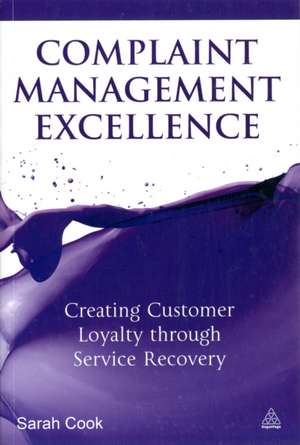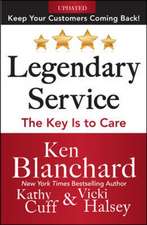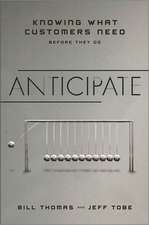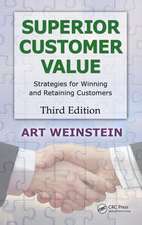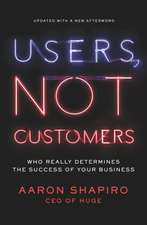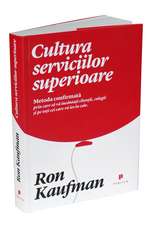Complaint Management Excellence – Creating Customer Loyalty through Service Recovery
Autor Sarah Cooken Limba Engleză Paperback – 2 mai 2012
Across the global economy, customers' expectations are continually rising but many companies fail to deliver against those expectations. With the rise in social media, customers are becoming more vocal in expressing any dissatisfaction, which can both lose existing customers and alienate potential new ones.
Consultant Sarah Cook provides practical advice, tools and techniques for managers to manage any complaints that come into their organization. Being able to properly handle customers' complaints and needs will improve the long term prospects for a company and can have a tremendous additional effect in terms of boosting employee morale.
Including case studies from several international companies, Complaint Management Excellence explains what customers are really looking for when they make a complaint, how to avoid conflict and how managers can lead the change to ensure the best experience for all.
Preț: 320.12 lei
Nou
Puncte Express: 480
Preț estimativ în valută:
61.26€ • 63.72$ • 50.58£
61.26€ • 63.72$ • 50.58£
Carte tipărită la comandă
Livrare economică 15-29 aprilie
Preluare comenzi: 021 569.72.76
Specificații
ISBN-13: 9780749465308
ISBN-10: 0749465301
Pagini: 208
Dimensiuni: 157 x 233 x 11 mm
Greutate: 0.33 kg
Editura: Kogan Page
ISBN-10: 0749465301
Pagini: 208
Dimensiuni: 157 x 233 x 11 mm
Greutate: 0.33 kg
Editura: Kogan Page
Cuprins
List of figures and tables
Preface
About the author
01 Complaints as opportunities
Increasing customer expectations
The power of a customer
Social media
Delivering excellent service
Levels of customer satisfaction
Customer complaints
What is a complaint?
Customer dissatisfaction
The risks involved in poor complaint handling
The positive power of effective complaint handling
The business case for excellent complaint handling
Key learning points
Rate your organization's approach to complaint handling
02 Encouraging dissatisfied customers to voice their complaints
Encouraging complaints
Why customers do not complain
Ways to encourage people to complain
Making best use of social media
Double deviation
The regulatory environment
Complaints standards bodies
Key learning points
Rate how well your organization encourages customers who are dissatisfied to complain
03 What people look for when they complain
What is important to customers when they complain
Fast resolutions to complaints
Call the customer
Single deviation
Taking complaints seriously
The emotional and economic cost of complaints
Empathy and apology
Meeting expectations
What makes best-in-class complaint handling?
What about money?
What to consider when offering redress
Types of financial and non-financial redress
Gestures of goodwill
Service guarantees
Key learning points
Customer complaint-handling checklist
04 Customer-management strategy and its implementation
Setting a strategy for you complaint management
Link to organizational vision and values
Hard and soft elements of a complaint-management strategy
Complaint-management policy and standards
Complaint-handling processes and procedures
Complaint-handling system
The people side
Recruitment
Induction
Training and competence
Empowerment
Measurement
Learning and improvement
Key learning points
Seven Ss assessment
05 Communication styles and emotional intelligence
Ways people choose to complain
How complaint handlers choose to respond
Emotional intelligence
Key learning points
06 The skills and behaviours needed for dealing effectively with complaints
Imagine you received this complaint on the phone
Listen first
Empathize and apologize
Ask questions
React positively and reach a solution
Notify the customer of the action and note what is to be done
Take action
Dealing with complaints in writing
Writing style
Structuring a written response
Key learning points
07 Recording and thoroughly investigating complaints
Recording complaints
Accuracy of logging
Why investigate thoroughly?
Investigation checklist
Explain the outcome
Key learning points
08 Conciliation, mediation and arbitration
Mediation
Where mediation adds value
When mediation is not appropriate
Conflict management
Impartiality
The mediation process
Questioning techniques
Influencing techniques
Mediation skills criteria
Key learning points
Will you make a good mediator?
09 Making improvements as a result of complaints
Learning from complaints
The benefits of root-cause analysis
Service-improvement activity should be a senior management responsibility
Pareto principle
Techniques you can use for root-cause analysis
Techniques for defining the problem
Generating options for improvement
Tips on how to implement an improvement plan effectively
Eastman Chemical root-cause analysis
Complaints as part of a wider customer feedback loop
Other ways to generate ideas for service improvement
Key learning points
10 Creating an environment that promotes high performance
The ideal complaint handler
Loyalty and engagement
Concentrate on your people first
How engaged are your work colleagues?
So how do you make more people in your team into stars?
Do not rely on pay and conditions alone as the basis of a retention strategy
Adopt a tailored approach
Key learning points
What are your team members' motivators?
11 Complaint handling and culture change
Customer service and culture change
Eight characteristics of excellent service organizations
Summary
Appendix: How customer-centric is your business?
References
Index
Notă biografică
Sarah Cook is the Managing Director of The Stairway Consultancy Ltd. She has more than 20 years' consulting experience specialising in leadership and management development. Before this, Sarah worked for Unilever and as head of customer care for a retail marketing consultancy. Sarah has practical experience helping managers to manage remotely and create high-performing teams. She has also worked extensively with team members to help them effectively transition to new ways of working. Sarah is a business author and has written widely on leadership, management development, team building and coaching. She also speaks regularly at conferences and seminars on these topics. Sarah is a Fellow of the Chartered Institute of Personnel Development and is a Chartered Marketer. She has an MA from the University of Cambridge and an MBA from The Open University. She is also an accredited user of a wide range of psychometric and team diagnostic tools.
Descriere
Cook provides practical advice, tools, and techniques for managers to manage any complaints that come into their organization. It explains customer intent, conflict, and management skills. Includes case studies from several international companies.
